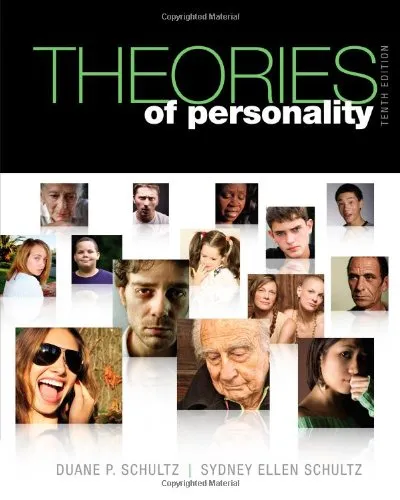Theories of Personality
4.5
Reviews from our users

You Can Ask your questions from this book's AI after Login
Each download or ask from book AI costs 2 points. To earn more free points, please visit the Points Guide Page and complete some valuable actions.Introduction to 'Theories of Personality'
The study of personality has fascinated psychologists, researchers, and theorists for decades. This intricate subject delves into the complexities of human nature, exploring what makes each individual unique. In our book, 'Theories of Personality', we aim to provide readers with a comprehensive understanding of the foundational theories, modern perspectives, and the empirical evidence that supports them. By weaving together historical context and practical analysis, we hope to foster a deeper appreciation for the diverse frameworks that define personality studies.
In this introductory text, we dissect the ideas of key figures like Sigmund Freud, Carl Jung, Alfred Adler, Abraham Maslow, and contemporary theorists, ensuring that readers grasp the evolution of personality science. Beyond theories, this book encourages readers to critically engage with the material and reflect on its relevance to real-world scenarios.
Detailed Summary of the Book
The book begins with an exploration of the psychoanalytic perspective, a domain pioneered by Freud and later expanded by other trailblazers like Jung and Adler. Their groundbreaking ideas on unconscious forces, intrapsychic conflicts, and defense mechanisms continue to play a pivotal role in modern therapeutic practices. Next, the focus shifts to the behavioral and learning approaches, championed by figures such as B.F. Skinner and Albert Bandura, who emphasize the impact of environment and experience on shaping personality.
Following this, we delve into the humanistic and existential theories, with special attention given to Maslow’s hierarchy of needs and Carl Rogers’ client-centered therapy. These frameworks underscore personal growth, self-actualization, and the human capacity for change. The later chapters address the trait theory perspective, led by Gordon Allport, Raymond Cattell, and Hans Eysenck, providing insights into measurable dimensions of personality, such as introversion and extraversion.
Finally, we introduce emerging trends and integrative approaches, including biological and evolutionary theories that link genetics and personality, as well as social-cognitive models that emphasize the interplay of thought, emotion, and societal influence.
Overall, the structure and content of the book reflect a balance between theoretical depth and practical application, ensuring that readers not only learn but also apply these concepts in their academic, professional, or personal lives.
Key Takeaways
- An in-depth exploration of major personality theories, from psychoanalysis to contemporary approaches.
- Insights into how personality theories influence psychology, therapy, and other allied disciplines.
- A critical analysis of key figures and their contributions, offering a well-rounded understanding of each perspective.
- Practical applications that help link theoretical concepts to real-world settings, including clinical practice and workplace dynamics.
- An emphasis on the interplay between nature, nurture, and individual experience in shaping personality.
Famous Quotes from the Book
“Personality theories are not just lenses through which we view human behavior; they are also tools that shape the way we navigate the world.”
“To understand personality is to understand the intricate tapestry of motivations, emotions, and social connections that define the human experience.”
“Behind every major scientific advance in studying human nature lies a philosophical quest to uncover the essence of who we are.”
Why This Book Matters
As human beings, we are inherently curious about what drives our behaviors, emotions, and actions. This book serves as a gateway to understanding the broad and interdisciplinary field of personality psychology. By presenting an unbiased and comprehensive look at the major theories, 'Theories of Personality' equips students, clinicians, and general readers with the tools they need to critically evaluate and apply these concepts in their personal and professional lives.
The relevance of this book extends beyond psychology classrooms. Whether you are a manager looking to build a cohesive team, a therapist aiming to improve client outcomes, or a parent seeking to better understand your child, the insights provided here are invaluable. Moreover, the text's emphasis on cultural and historical contexts ensures that readers understand how personality psychology has evolved and adapted to contemporary challenges, such as globalization, technological advancements, and mental health crises.
In a world where individuality is celebrated and interpersonal dynamics grow ever more complex, developing a strong grasp of personality theories will help us build stronger relationships and foster greater empathy.
Free Direct Download
You Can Download this book after Login
Accessing books through legal platforms and public libraries not only supports the rights of authors and publishers but also contributes to the sustainability of reading culture. Before downloading, please take a moment to consider these options.
Find this book on other platforms:
WorldCat helps you find books in libraries worldwide.
See ratings, reviews, and discussions on Goodreads.
Find and buy rare or used books on AbeBooks.
1124
بازدید4.5
امتیاز50
نظر98%
رضایتReviews:
4.5
Based on 0 users review
"کیفیت چاپ عالی بود، خیلی راضیام"
Questions & Answers
Ask questions about this book or help others by answering
No questions yet. Be the first to ask!


